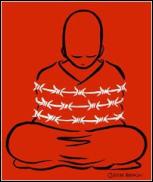Burma: Prisoners forced to work on Akyab-Rangoon Highway
Prisoners from different jails in Arakan State were used as workforce on the Akyab-Rangoon highway on December 20. The highway was damaged by rains in the monsoons.Fifty of the prisoners are from Akyab and were brought out of jail on December 15, while 50 were from Kyaukpru jail brought out on December 16 and 50 from Buthidaung jail made to work on December 17, on the Akyab-Rangoon highway under Myebon Township -- pillar No.52 and 53, said a source close to jail authorities.All the prisoners are under the control of the Western Command and are kept in a temporary camp which was made by prisoners at pillar No. 52 and 53 of the Akyab-Rangoon highway.The prisoners started work on the road on December 20. They are also working in brick kilns and collecting wood for the brick field, digging rock and earth for the road, said a local in Myebon.The prisoners also will work on bridges leading to the road.
A senior United Nations official expelled from Burma this week warned on Wednesday that a “more volatile situation” lay ahead if the country’s military regime refused to recognise that recent mass protests stemmed from common people’s anger over economic woes.
In an interview with the Financial Times, Charles Petrie, who until his expulsion on Tuesday was the most senior UN official in Rangoon, warned that without substantive reforms the Burmese junta could be forced to resort to greater repression to keep control over a restive population.
“It’s very dangerous for the regime not to understand the grievances that people expressed on the streets,” Mr Petrie said. “People came out [to demonstrate] because the pain they are feeling is too much – they are suffering.”
The regime’s refusal to acknowledge these fundamental grievances, and continued repression, were “a pretty bad cocktail”, he said. “It creates the conditions for an even more volatile situation, which the regime will only be able to contain by increasing violence and intimidation.”
Burma’s military rulers stunned the international community last month when they abruptly announced that they were ejecting Mr Petrie. The move followed the release of a statement by the UN country team in which it said the September protests reflected widespread frustration “at the everyday struggle to meet basic needs” and called for the junta to address a “deteriorating humanitarian situation”.
The generals – who have characterised the mass protests as a CIA plot to overthrow them – accused Mr Petrie, who was the UN humanitarian co-ordinator and Development Programme representative, of “acting beyond his capacity by issuing a statement that harms [Burma’s] reputation”.
Mr Petrie, who was granted a month to leave to ensure an “orderly transition”, said the move against him was part of the regime’s broader campaign to harass its critics and browbeat the local population.
“My expulsion is part of the intimidation,” he said.
Mr Petrie’s comments came as the military toughened its stance towards its domestic and international critics, after making a few conciliatory gestures following the global outcry at their suppression of the protests.
On Monday Brig-Gen Kyaw Hsan, information minister, rejected calls by Ibrahim Gambari, the UN special envoy for Burma, for the regime to engage in a dialogue with Aung San Suu Kyi, the Nobel Prize-winning democracy advocate, on a new constitution.
In a rare press conference, the minister said the regime was moving ahead and did not need “assistance and advice from other persons”.


















 The leader of the All-Burma Monks Alliance (ABMA) has been arrested and charged with treason for his role in the September pro-democracy demonstrations. Treason is a capital crime in Burma. If convicted and executed, 27 year-old U Gambira would be the first monk to be put to death in Burma since the British colonial rulers hanged a monk who lead a rebellion 70 years ago.
The leader of the All-Burma Monks Alliance (ABMA) has been arrested and charged with treason for his role in the September pro-democracy demonstrations. Treason is a capital crime in Burma. If convicted and executed, 27 year-old U Gambira would be the first monk to be put to death in Burma since the British colonial rulers hanged a monk who lead a rebellion 70 years ago.![[International+Human+Rights+1.jpg]](https://blogger.googleusercontent.com/img/b/R29vZ2xl/AVvXsEhqSPFy48kYBpAZS4e_NNWhWA0IwH_XrP9r-hrJpkCd_1hldoNbqmVRV-jLUehlWfU2EpMmiGGP9YyFCG78Hy3iln5c28hofxG_4uPOKk-HMGkuj0mOzwub-Z3umM7D0h4I8HDv0np48c5G/s1600/International+Human+Rights+1.jpg)
![[Please+protect+Sayadaws.JPG]](https://blogger.googleusercontent.com/img/b/R29vZ2xl/AVvXsEjo7oPUBsgps1885r0qdwJnUqtnesVcQCHWjnbs3fivtpA2S1OHLPL81an2ZzUxBFmeBP-vScnsIQxdFVH70G2gyZGneBEtxQws7d-YvSD4d91mTgRHDXJZckbZa_GZjLV1KayCQDiw_NsF/s1600/Please+protect+Sayadaws.JPG)

![[17-Nov-07-Invitation-for-Di.gif]](http://bp2.blogger.com/_y1ABmDAthkw/Rzv3fPJ9zNI/AAAAAAAAAkQ/L_9kC-37Dtk/s1600/17-Nov-07-Invitation-for-Di.gif)


![[ScannedImage-19.jpg]](https://blogger.googleusercontent.com/img/b/R29vZ2xl/AVvXsEhl5qF_P_GBL8gNeFTqMjsc_pyLBroilLmLp3waXgtEE-TP0EDhe8L_2Ccbc_XB3YGsjGTM5gbClKjxVybT6PES5aigb8bheJxVvp66m4AJD11aiaOdFVowO5xmoaABqkXqEdz4e_XZxdSZ/s1600/ScannedImage-19.jpg)










